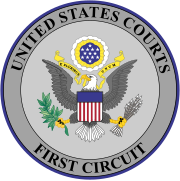| Mashpee Tribe v. New Seabury Corp. | |
|---|---|
 | |
| Court | United States Court of Appeals for the First Circuit |
| Full case name | Mashpee Tribe v. New Seabury Corp. |
| Decided | Feb. 13, 1979 |
| Citation | 592 F.2d 575 (1st Cir. 1979) |
| Case history | |
| Prior actions | 427 F. Supp. 899 (D. Mass. 1977) (denying motion to dismiss); 447 F. Supp. 940 (D. Mass. 1978) (entering judgment for the defendant) |
| Court membership | |
| Judges sitting | Frank M. Coffin, Levin H. Campbell, Hugh H. Bownes |
| Case opinions | |
| Coffin, joined by Campbell and Bownes Bownes (concurring) | |
Mashpee Tribe v. New Seabury Corp., 592 F.2d 575 (1st Cir. 1979), was the first litigation of the Nonintercourse Act to go to a jury.[1] After a 40-day trial, the jury decided that the Mashpee Tribe was not a "tribe" at several of the relevant dates for the litigation, and the United States Court of Appeals for the First Circuit upheld that determination (the panel included two judges from the landmark Joint Tribal Council of the Passamaquoddy Tribe v. Morton (1975) panel).
The Mashpee, as a tribe and individually, attempted to re-litigate the issue several times without success.[2] In 2007, the Department of the Interior granted federal recognition to the Mashpee,[3] and the tribe and the town of Mashpee, Massachusetts entered into a settlement agreement.[4]
- ^ Cite error: The named reference
v27was invoked but never defined (see the help page). - ^ Mashpee Tribe v. Secretary of Interior, 820 F.2d 480 (1st Cir. 1987) (Breyer, J.); Mashpee Tribe v. Watt, 542 F. Supp. 797 (D. Mass. 1982), aff'd, 707 F.2d 23 (1st Cir. 1983).
- ^ 72 Fed. Reg. 8007-01 (2007).
- ^ Bingham v. Massachusetts, 2009 WL 1259963 (D. Mass. 2009), aff'd, 616 F.3d 1, 6 n.7 (1st Cir. 2010) ("We do not decide what effect the Department of the Interior's 2007 designation of the Mashpee Wampanoag as a federally recognized tribe has on [the three preceding] opinions."); id. at 6 n.8 ("In April 2008, the tribe entered into an agreement with the Town in which it received certain Town lands in exchange for waiving all claims to property located within the Town.").